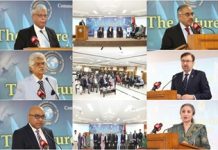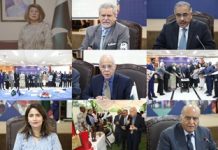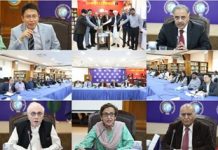The Institute of Strategic Studies, Islamabad (ISSI) hosted an In-House Meeting on April 22, 2015 with Dr Ishrat Husain, Dean and Director, Institute of Business Administration (IBA), Karachi, and former Governor of the State Bank of Pakistan. The topic for discussion at the meeting was “Global Economic Trends”.
Welcoming the distinguished guest, the Chairman ISSI, Ambassador Khalid Mahmood extolled the accomplishments of Dr Husain, deeming him a man of extraordinary talents who is renowned at the national and international level due to his appointment at high posts both within Pakistan, and abroad.
The Director General ISSI, Mr. Masood Khan said that Dr Husain was Pakistan’s pre-eminent economist and academic, and his achievements are evident from his many publications, chief among them being Pakistan: The Economy of an Elitist State, which has been acknowledged within the country and outside as being a seminal work.
Dr Ishrat Husain identified six major trends affecting the global economy today which include: the forces of globalization; shift from traditional agriculture and industry to knowledge driven economy; the new emerging economies; demographic changes; climate change; and the ICT revolution.
Globalization, he stressed, is in an important game changer, entailing the exchange of goods and services, including financial capital flows, remittances, flow of workers, and transfers of technology. He was of the view that on a policy level, we need to understand that there is no need to stop globalization, but to manage it.The future, he stressed, will rely greatly on a knowledge-based economy in which knowledge will be used to translate knowledge into workable, sustainable solutions, as opposed to labour-intensive work. Elaborating on demographic changes, he pointed towards the negative population rates in Europe and Japan, as opposed to the youth bulge in Asia and Africa which can be a positive factor for their economies if they are effectively attuned and trained. Talking about climate change, Dr Husain said that policy makers in Pakistan need to shed their complacent attitude towards climate change, and need to work cooperatively with both China and India in order to smooth out climate-related issues well in time. He regarded the internet revolution as a non-hierarchical agent of change where individuals and policies can be held accountable by anyone on accounts like Twitter and Facebook.
Based on all these facts, Dr Husain was of the view that we should move towards building economic synergies within Asia, instead of vying for GSP plus statuses.
Aimen B/042215











